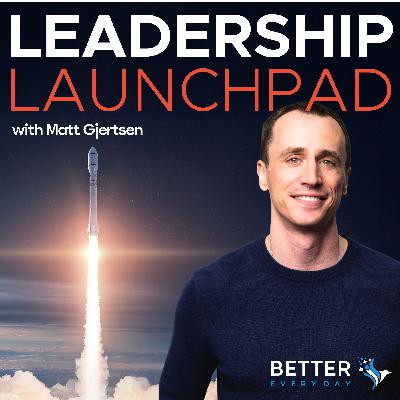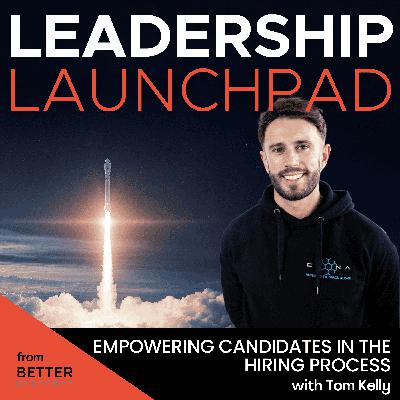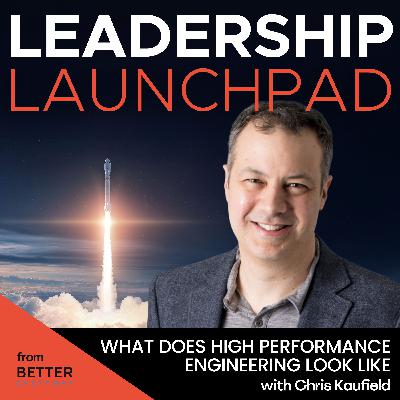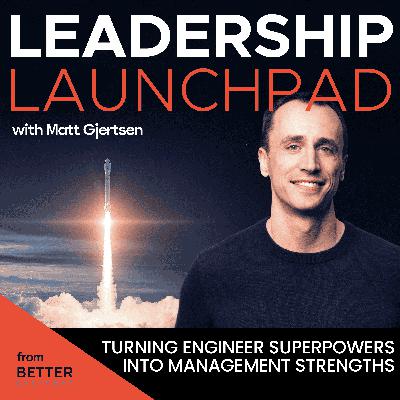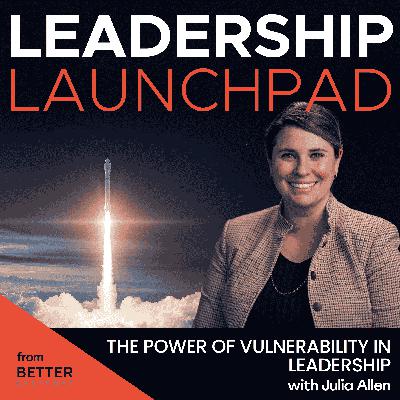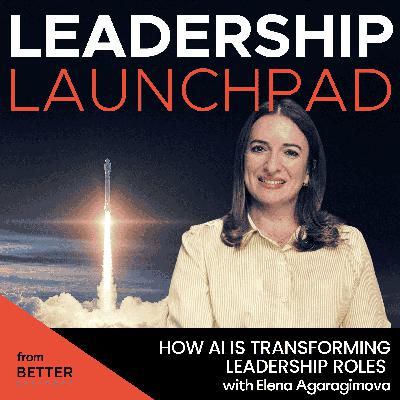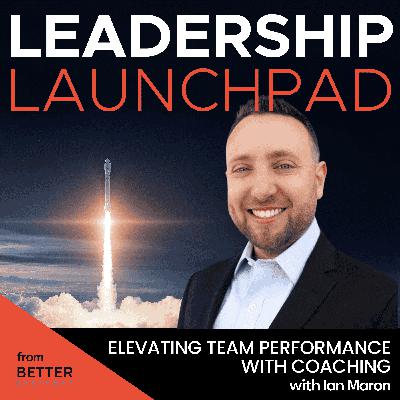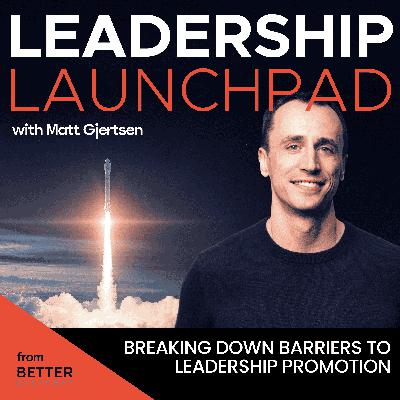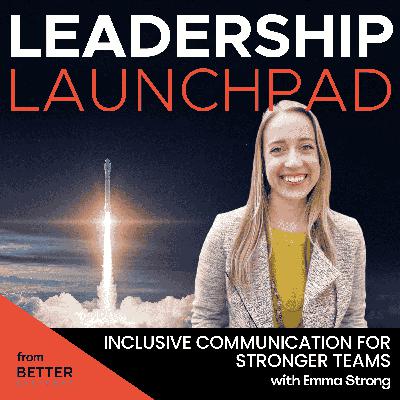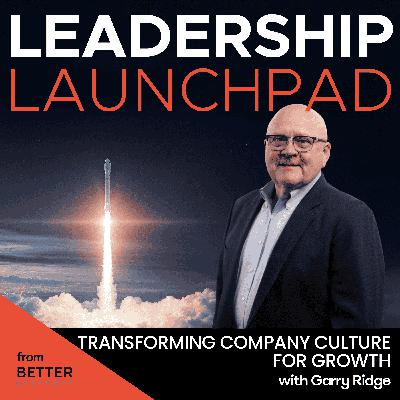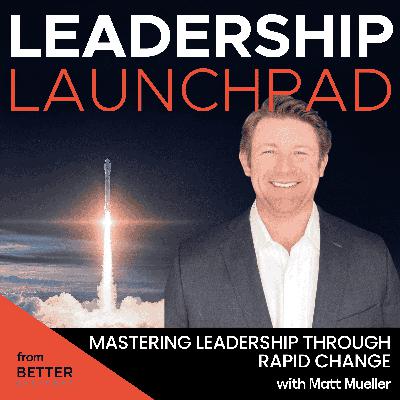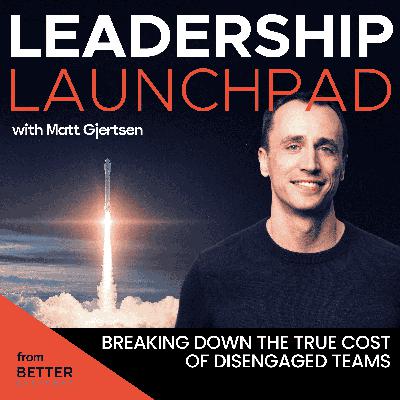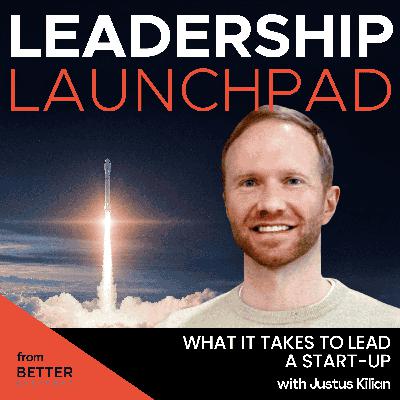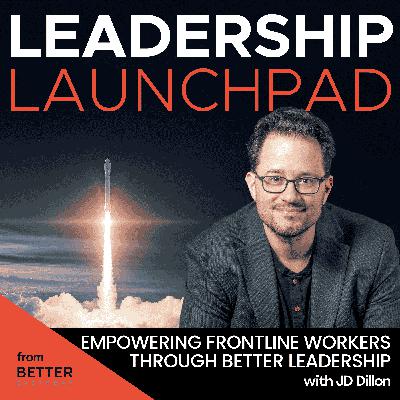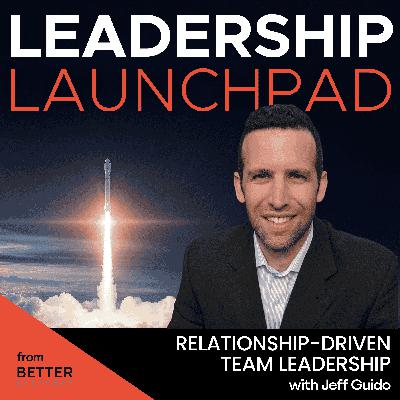Discover Leadership Launchpad – Team Development, & Performance Improvement for Aerospace & Technology Managers
Leadership Launchpad – Team Development, & Performance Improvement for Aerospace & Technology Managers

Leadership Launchpad – Team Development, & Performance Improvement for Aerospace & Technology Managers
Author: Matt Gjertsen - Better Every Day Studios
Subscribed: 11Played: 199Subscribe
Share
© Better Every Day Studios - Matthew Gjertsen
Description
Welcome to the Leadership Launchpad where we help technical managers improve themselves, their teams, and their organizations. Over the course of 20 years working in aerospace and technology, I have gotten to work with some of the smartest people on the planet and I have witnessed first hand how many of them struggle making that first jump to people leadership. On this show I talk with industry leaders, coaches, and authors to help give you actionable leadership insights to help improve your own performance and the performance of those around you.
159 Episodes
Reverse
This solo episode delves into the common misconception that training is a quick fix for workplace issues. Drawing insights from a recent industry conference, the discussion focuses on why training often fails to address real business problems and outlines four essential questions managers should ask before pursuing a training solution. Listeners will learn how to distinguish between individual performance issues and broader organizational challenges, the importance of proper documentation and resource availability, and the critical role of feedback in driving behavioral change. The episode offers practical guidance for managers looking to implement effective training that truly impacts performance, while also previewing a series of upcoming conversations with learning leaders from major organizations.
In this episode, Lucie Nurdin, a chemical engineer and former interim technical director at Terraform Industries, shares her journey transitioning from academia to the startup world and from individual contributor to manager. She discusses the technical challenges of developing economically viable synthetic fuels from CO2 and sunlight, and reflects on her experiences leading and growing a technical team. Lucie Nurdin talks about building trust, effective delegation, fostering team communication, and the importance of empowering people by leveraging both their strengths and weaknesses. She also offers insight on how to create a collaborative and feedback-driven work environment, drawing on lessons learned from both academic research and her leadership role in industry.
In this episode, leadership strategist and executive coach Andrea Wanerstrand shares insights from her experience inside global companies like Microsoft, Meta, and T-Mobile. Andrea discusses the cultural and leadership transformation at Microsoft, highlighting the shift from a know-it-all to a learn-it-all mindset and the importance of psychological safety, growth mindset, and resilience. The conversation also covers her A3 philosophy—authentic, autonomous, and accountable leadership—and practical ways leaders can build trust, give effective feedback, and foster autonomy in their teams. Andrea emphasizes the value of consistent authenticity, clear communication, and caring leadership that balances kindness with accountability. The episode also touches on Andrea’s experience running a lavender farm as a way to find balance and stay grounded outside the corporate world.
Why is it so hard to get things done in large companies? In this solo episode of the Leadership Launchpad, Matt explores the benefits and the struggles of bureaucracy and gives tips every leader can use to help fight it on their teams. If you want your teams to be productive in a world that doesn't stop changing, you have to watch this episode.Want more tips on being an effective manager? Sign-up for our weekly newsletter: https://www.bettereverydaystudios.com/sign-upVisit us at https://www.bettereverydaystudios.com
In this episode, Yaron Alfi, co-founder and CEO of Magenta, discusses his experiences in software and manufacturing at companies like SpaceX and ABL Space Systems. He explains why legacy software can be a limiting factor in manufacturing, the importance of building tailored software solutions, and how Magenta is leveraging AI to streamline manufacturing workflows. Yaron also shares leadership lessons from his time at SpaceX, his approach to building and scaling teams, and the value of trust in both formal and informal leadership roles. The conversation covers challenges in hiring for software roles, managing change, and providing effective support to technical teams in high-pressure environments.
In this episode, Warren Ernst joins the show to discuss his extensive experience in learning and development across several innovative startups, including SpaceX, Karma Automotive, Heliogen, and Impulse Space. The conversation focuses on the significant impact that manager development has on company success, especially in fast-growing organizations. Warren shares insights on common skill gaps for new managers, such as giving feedback, delegating tasks, and meeting discipline. He also highlights how lack of proper training for managers can lead to drops in productivity, retention issues, and culture challenges. The episode offers practical advice for both organizations and individual managers aiming to improve leadership effectiveness and team performance.
In this episode, guest Tom Kelly, co-founder of Evona, a recruitment firm specializing in the space industry, discusses the current talent landscape and the impact of AI on recruitment. The conversation explores the most in-demand roles within the space sector, highlighting ongoing shortages in both engineering (especially electrical engineering) and sales positions. Tom shares insights into how AI-driven tools are transforming the hiring process, from sourcing candidates to automating outreach, as well as potential challenges, such as increased spam and the loss of personal connection in recruiting. He also considers the future of talent acquisition, including how candidates might use AI to empower their own job searches. The episode provides a practical look at both the opportunities and hurdles of integrating AI into recruiting, with a focus on maintaining meaningful human connections.
In this repeat episode with Chris Kaufield, we explore the intricacies of high cadence engineering and leadership. Chris, VP of SaaS Growth at Stoke Space, shares how distributed ownership in engineering leads to collaborative success. We delve into Stoke’s mission to achieve rapid, reusable rocket flights, drawing parallels between hardware and software development. Chris highlights optimizing products by focusing on immutable laws and customer-centric approaches while emphasizing data-driven decision-making and traceability. Tune in to uncover how leadership and cultural shifts forge groundbreaking technologies and drive organizational growth. Whether you're an engineering enthusiast or a leader aiming for excellence, this episode is packed with invaluable insights. Don’t miss out! 🌟🚀Connect with Chris on LinkedIn: https://www.linkedin.com/in/chriskaufield/Want more tips on effective training? Sign-up for our weekly newsletter: https://www.bettereverydaystudios.com/newsletterVisit us at https://www.bettereverydaystudios.com#Leadership #Engineering #Innovation #HighCadence #OrganizationalCulture #Stokespace #RocketDevelopment #DistributedOwnership #Traceability #ProductOptimization #DataDriven #SaaS #Breakthrough #Collaboration #ChrisKaufield #MattGjertsen
In this solo episode, Matt explores why engineers often struggle when they transition into people management roles, despite having unique strengths that could make them exceptional leaders. The discussion is structured around three core “superpowers” that engineers possess: technical credibility, data-driven decision-making, and systems thinking. The episode examines how these strengths can inadvertently become weaknesses, such as leading to micromanagement or overlooking team dynamics. Solutions are offered from both organizational and individual perspectives, emphasizing the importance of support, clear expectations, and focusing on team success over individual achievement. This episode is ideal for anyone interested in developing effective engineering managers.
In this episode, Julia Allen, former Chief Technology Officer at Saab, shares her leadership experiences across the military, government, and tech industries. She discusses her time as a company commander in the Maryland National Guard, emphasizing the importance of building trust within diverse teams and adapting leadership styles to different environments. Julia also highlights how establishing a culture of vulnerability, celebrating team achievements, and shouldering responsibility help foster high-performing teams. The conversation covers techniques for managing technical projects, such as maintaining a risk register, and explores the value of generalist skills for leaders in innovative fields. Julia’s insights offer practical advice for current and aspiring leaders looking to create strong, collaborative, and adaptive teams.
In this episode, Elena Agaragimova, co-founder and CEO of Shiftwell, joins to discuss the role of AI in modern management and leadership. Drawing on her experience in talent development and performance, Elena explains how AI tools can help both individual employees and managers. She highlights how AI can support employees in taking ownership of their performance and well-being, while also freeing managers from some administrative tasks so they can focus on more strategic responsibilities. The conversation covers the challenges faced by middle managers, the importance of data-driven insights, and the evolving future of AI-powered coaching. Elena also shares her perspective on how AI tools differ from traditional engagement surveys and coaching, and offers thoughts on where this technology may be heading.
In this episode of Leadership Launchpad, Ian Maron, VP of People and Talent at Apex, joins the show to discuss the value of coaching in leadership, particularly in technical and engineering environments. Ian shares insights from his career journey—from teaching with Teach for America to leading HR and people teams at several companies, including startups in the aerospace industry. The conversation explores the key differences between management, mentorship, and coaching, highlighting the importance of having a range of leadership tools. Ian introduces the GROW model (Goals, Reality, Options, What’s next) as a practical approach managers can use to develop their teams and shares a live coaching session that demonstrates its use. The episode offers actionable techniques for new managers and leaders looking to foster growth, creativity, and autonomy within their teams.
In this solo episode, Matt explores why talented engineers and technical experts often avoid management roles and what that means for organizational success. Drawing on recent conversations with HR professionals and experiences in various companies, the episode breaks down the root causes of this leadership gap—highlighting overly complicated management systems, excessive bureaucracy, and misaligned promotion criteria as key contributors. The discussion also covers the organizational costs of this trend, such as hiring difficulties and ineffective leadership. To address these issues, the episode introduces the concept of “first principles management,” offering a simplified, foundational approach to developing effective managers, especially from technical backgrounds.
In this episode, guest Emma Strong, Senior Learning Development Program Manager at Veritex Legal Solutions, shares her approach to designing a leadership development program for new managers and leaders. Emma explains how the program was tailored with different tracks for team leads, managers, and supervisors, taking into account whether participants were promoted internally or hired externally. The conversation covers the importance of addressing unique challenges like transitioning from peer to leader, setting clear role expectations, and fostering inclusive communication. Emma also highlights balancing legal compliance topics with practical leadership skills and the value of continuous learning and open communication for new leaders. This episode offers practical insights for anyone developing or participating in leadership training.
In this episode, Garry Ridge, former CEO of WD-40, shares insights from his journey transforming WD-40 into a globally recognized brand by prioritizing company culture over just product focus. He discusses the importance of building a culture where employees feel they belong, know they matter, and are empowered to make decisions without fear. Garry outlines key steps leaders can take to foster engagement, psychological safety, and learning within their teams. Drawing from his experiences and his recent book, he explains why self-awareness, servant leadership, and coaching—not managing—are essential for effective leadership. The conversation also touches on the challenges facing new leaders and practical strategies for cultivating a positive and productive workplace culture at any organizational level.
In this episode, Matt Mueller, a SpaceX veteran and co-founder of Glīd, shares his experiences and lessons learned from leading technical teams in high-stakes environments. He talks about his early days managing a team of experienced technicians at Honeywell and transitioning to leading engineers at SpaceX. Matt discusses the challenges of balancing technical expertise with managerial responsibilities, the importance of understanding team context, and strategies for staying connected to the technical side while leading effectively. He also introduces his current work at Glīd, a startup aimed at streamlining road-to-rail freight transportation. This episode provides practical insights for managers in technical fields who are seeking ways to effectively lead their teams and stay engaged with both people and technical challenges.
In this episode of Leadership Launchpad, host Matt Gjertsen dives deep into one of the biggest issues facing organizations today: poor employee engagement and its staggering $1.9 trillion cost to the US economy each year. Drawing on years of experience—from serving as an Air Force instructor pilot to leading training and development at SpaceX, and now running his own consultancy—Matt unpacks the latest Gallup research on the true state of engagement in the workplace.Tune in as Matt breaks down why engagement is at a 10-year low, explores the three key reasons employees become disengaged, and explains the significant impact this has on productivity, innovation, and retention. Most importantly, he shares one actionable strategy every manager can implement right away: clear and consistent development conversations.
In this episode, host Matt Gjertsen and guest Justus Kilian dive deep into what truly makes leaders stand out—well beyond what any MBA program can teach. Justus, a partner at Space Capital and an expert in evaluating startup founders, shares the six core leadership skills he looks for when betting on new companies. Together, they break down essential leadership traits like unreasonable persistence, adaptability, cross-functional experience, first principles thinking, adaptive “heat” management, and the art of negotiation.Matt and Justus explore why strong leadership is critical for both startups and established organizations, and discuss red flags that can derail a promising leader. Whether you’re an aspiring founder, new manager, or just looking to step up your leadership game, this episode is packed with practical insights and actionable tips you can apply right away.
In this episode of Leadership Launchpad, host Matt Gjertsen sits down with JD Dillon, Chief Learning Architect at Axonify and renowned author, for an in-depth conversation about one of the most overlooked yet critical segments of the workforce: frontline employees. Drawing on years of experience and his soon-to-be-released book, JD breaks down what truly defines frontline workers, why supporting them is so uniquely challenging—especially in manufacturing and technical environments—and how organizations can better enable their success.
In this episode of Leadership Launchpad, Jeff Guido, Senior Director of New Missions at Planet Labs, shares his insights on effective leadership in technical organizations. Jeff discusses his experience transitioning from a technical individual contributor to a leader, highlighting the challenges and strategies involved in delegation and empowering teams. He emphasizes the importance of building strong relationships and trust within teams, both internally and across organizations, to enable effective collaboration and problem-solving. The conversation also covers practical techniques for onboarding new team members, balancing early engagement with support, and fostering a culture where decision-making is delegated appropriately. Whether you're a new manager or working to develop leaders in your organization, this episode offers valuable advice on cultivating trust and empowering technical teams.


